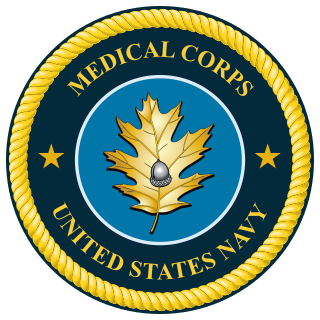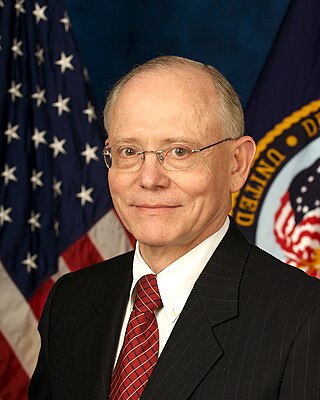Surgeon general is a title used in several Commonwealth countries and most NATO nations to refer either to a senior military medical officer or to a senior uniformed physician commissioned by the government and entrusted with public health responsibilities. The title originated in the 17th century, as military units acquired their own physicians.

The U.S. Army Medical Command (MEDCOM) is a direct reporting unit of the U.S. Army that formerly provided command and control of the Army's fixed-facility medical, dental, and veterinary treatment facilities, providing preventive care, medical research and development and training institutions. On 1 October 2019, operational and administrative control of all military medical facilities transitioned to the Defense Health Agency.

The Walter Reed Army Medical Center (WRAMC), officially known as Walter Reed General Hospital (WRGH) until 1951, was the U.S. Army's flagship medical center from 1909 to 2011. Located on 113 acres (46 ha) in Washington, D.C., it served more than 150,000 active and retired personnel from all branches of the United States Armed Forces. The center was named after Walter Reed, a U.S. Army physician and sergeant who led the team that confirmed that yellow fever is transmitted by mosquitoes rather than direct physical contact.

The Medical Corps of the United States Navy is a staff corps consisting of military physicians in a variety of specialties. It is the senior corps among all staff corps, second in precedence only to line officers. The corps of commissioned officers was founded on March 3, 1871.

The National Center for Medical Intelligence (NCMI), formerly known as the Armed Forces Medical Intelligence Center, is a component of the United States Defense Intelligence Agency (DIA) responsible for the production of medical intelligence and all-source intelligence on foreign health threats and other medical issues to protect U.S. interests worldwide. Headquartered at Fort Detrick, Maryland, the center provides finished intelligence products to the Department of Defense, U.S. Intelligence Community, Five Eyes, NATO, allies and partners, as well as international health organizations and NGO's.
In the United States Army and Marine Corps, a battalion aid station is a medical section within a battalion's support company. As such, it is the forwardmost medically staffed treatment location.

The Medical community as used in this article refers to medical institutions and services offered to populations under the jurisdiction of the late Roman Republic and the Roman Empire. The Medical services of the Roman Republic and the early Roman Empire were adopted from ancient Greece. It was first imported from Greece through Greek colonies in Magna Graecia and the Etruscan civilization. After the Roman conquest of Greece, enslaved Greeks brought more Greek medical knowledge to Rome. In 219 BCE a surgeon named Archagathus traveled from the Peloponnesus to Rome. He became a citizen and purchased a taberna near a crossroads. This became the first officina medica. Previously, the pater familias was responsible for the medical art in early Rome. Physicians in ancient Rome would take the Hippocratic Oath. Doctors would begin their appointments with patients by stating "si vales valeo," which translated to "if you are well I am well." Physicians were often wealthy. Augustus' physician, Antonius Musa, received a salary of 30,000 sesterces. Doctors would also serve in the Roman military and treat injured soldiers.

Gale S. Pollock is a retired United States Army major general who served as the Deputy Surgeon General of the United States Army from October 2006 to March 2007, and also as chief of the Army Nurse Corps. She became acting Surgeon General of the United States Army for nine months following the 20 March 2007 retirement of her predecessor, Kevin C. Kiley, due to fallout from the Walter Reed Army Medical Center neglect scandal. She was the first woman and the first non-physician to hold the position.

The Canadian Forces Health Services Group is a formation of the Canadian Forces within the Military Personnel Command. It includes personnel from both the Royal Canadian Medical Service and the Royal Canadian Dental Corps, fulfills all military health system functions from education and clinical services to research and public health, and is composed of health professionals from over 40 occupations and specialties in over 120 units and detachments across Canada and abroad.

James Benjamin Peake was the sixth United States Secretary of Veterans Affairs, serving from 2007 to 2009. In 2004, he retired from a 38-year United States Army career. He also served as the 40th Surgeon General of the United States Army.

James K. Gilman, a retired United States Army Major General and physician from Hymera, Indiana, became the first chief executive officer of the NIH Clinical Center Jan. 9, 2017. The NIH Clinical Center is the nation's largest hospital devoted to clinical research.
The Surgeon General is the professional head of the Canadian military health jurisdiction, the adviser to the Minister of National Defence and the Chief of Defence Staff on all matters related to health, and head of the Royal Canadian Medical Service. The Surgeon General may also be appointed the commander of the Canadian Forces Health Services Group, which fulfils all military health system functions from education and clinical services to research and public health. It consists of the Royal Canadian Medical Service, the Royal Canadian Dental Corps, personnel from other branches of the armed forces, and civilians, with health professionals from over 45 occupations and specialties in over 125 units and detachments across Canada and abroad. When appointed Director General Health Services, the Surgeon General is also the senior health services staff officer in the Department of National Defence. The Surgeon General is normally appointed to the Medical Household as Honorary Physician (KHP) or Honorary Surgeon (KHS) to His Majesty the King.

Joseph Caravalho Jr. is an American physician and retired Major General of the Medical Corps of the United States Army. He is currently the president and CEO of the Henry M. Jackson Foundation for the Advancement of Military Medicine. He has held specialized staff medical positions, served in operations at hospitals, and commanded major medical installations across the United States as well as operations in actions overseas. In December 2015, he was appointed as the Joint Staff surgeon, the chief medical advisor to the Chairman of the Joint Chiefs of Staff.
Major-General John Wilmer Browning Barr CMM, KStJ, CD, QHP, MD, CM, DHA was the 25th Canadian Surgeon General.

The Committee of Chiefs of Military Medical Services in NATO (COMEDS) is the North Atlantic Alliance's senior medical body, reporting to the NATO Military Committee. It is headed by a chairman, is composed of the Surgeons General of the allied nations and the senior medical advisers within NATO's command structure, and meets twice annually in plenary session. Supported by NATO's integral medical staff and numerous specialized multi-national working groups and panels, COMEDS acts as the central point for the development and coordination of common standards and for providing medical advice to the Military Committee.
Roger van Hoof is a Belgian retired military physician and major general who served as Surgeon General between 1999 and 2006, as the 2nd chairman of the committee of Surgeons General of NATO nations between 1999 and 2005, and has been Secretary General of the International Committee of Military Medicine since 2011.
Jean-Robert Bernier is a Canadian military physician who served as the 38th Canadian Surgeon General and chief medical adviser to the North Atlantic Alliance as the 7th chairman of NATO's Committee of Chiefs of Military Medical Services (COMEDS).
Brigadier-General Hugh Colin MacKay OMM, CD, QHP, MD, MHSc, FRCPC(hon) was the 39th Canadian Surgeon General.

The Deputy Chair of the NATO Military Committee (DCMC) is the deputy head of the NATO Military Committee. Originally titled as the Deputy Chairman, the post was redesignated in 2021 to reflect the gender-neutrality of the post.
Zoltán Bubeník is the Czech Surgeon General and the chief medical adviser to the North Atlantic Alliance as the 8th Chairman of COMEDS, the committee of Surgeons General of NATO and partner nations.












